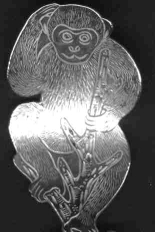Water leaks can be difficult to trace - as you know.
DGP's first suggestion of replacing the hoses is first on the list. You had the rad replaced 2-3 years ago, and legit mechanics would replace the hoses (and clamps) at the same time, so 2-3 years would be a very short time for those hoses (should go 5-8 years at least.)
First order of business - just double check the clamps, and make sure they are tight. Better yet, pull off the hoses and make sure the inlet/outlet are free of corrosion and that the hoses are also clean on the inside.
Second, as you noted, 2-3 years on a rad is way too short. Is it copper or aluminum? Plastic upper and lower reservoirs (ie. at the top and bottom of the cooling tube assembly)? If aluminum - are there any portions of the aluminum assembly that make contact with steel screws/frame/steel-iron clamps etc. If so, that contact causes galvanic corrosion of the aluminum- and should be corrected. Zinc plated screws will sacrifice to aluminum - aluminum sacrifices to steel/copper - and copper reigns best - because steel sacrifices to copper. I lost three AL heater cores in a two year period to this problem, when the original core had lasted well over 10 years.
Bad replacement procedures by the radiator shop - didn't ever go back to them.
Plastic top and bottomm -there is an O-ring type seal, usually neoprene, around the entire inner perimeter that can sometimes leak - especially on a rebuilt rad (dirt usually, neoprene is pretty long lasting).
Next: Warped head - possibly. How did the mechanic diagnose a 'bad intake valve' ? Vacuum check is insufficient, and a compression test (best for det valve/ring conditions) would have probably revealed a warped head with low compression all around. Intake valves usually dont go bad due to overheating, but Exhaust valves do. How the mechanic narrowed it to an intake vs. exhaust is beyond me.
A cylinder head gasket blown between a cooling port and a cylinder would also result in exhaust gases in the cooling system (low compression, single cylinder) - plus white smoke (when bad enough)as Nemo pointed out. A cracked head can also leak coolant, and not show on a compression/vacuum test.
Diagnostics have change over the last 20 years, so there may be more sophisticated sensors/tests that I know nothing of - but the above basics still serve.
2 Grand for a coolant leak, even in worst case, definitely sounds way too high. Can remember when a vehicle could be long blocked for that much, twice over.
Good luck - doubt any of the above is very helpful - but gave it a whirl.

Finally, brethren, whatsoever things are true, whatsoever things are honest, whatsoever things are just, whatsoever things are pure, whatsoever things are lovely, whatsoever things are of good ...
